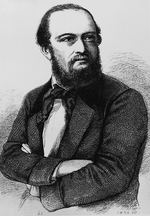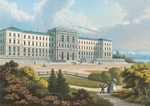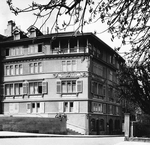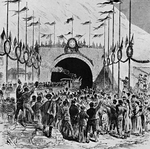Main Content
Alfred Escher – Biography in brief
Zurich-born Alfred Escher was the outstanding figure in the political and economic life of 19th century Switzerland. He was a pioneer who was able to make the most of the dynamic environment that existed during the founding years of the new federal state.
Escher's ascent through cantonal and federal politics was meteoric. At 26 he was elected to Zurich cantonal parliament and to the Federal Council of Cantonal Representatives (the Tagsatzung: the precursor to Switzerland's Council of States). At 29 he joined Zurich's cantonal government, was elected president of the cantonal parliament for the first time and was one of the youngest members of the first ever National Council in 1848. At 30 he became president of the cantonal government and of the National Council for the first time. Switzerland's newly created parliament had not even had its first meeting when the 29-year-old Escher was sent to Canton Ticino as a Federal Commissioner. Over his entire political career, Escher sat on more than 200 national and cantonal parliamentary committees, many of which he also chaired. The maxims of Switzerland's neutrality policy, which still hold to this day, can be attributed to Escher. In the Neuchâtel conflict, the Savoy dispute and when addressing the issue of refugees, he advocated a pragmatic foreign policy that emphasized economic rather than military strength.
Escher enjoyed roughly a decade of extraordinary success from 1848/49 until the early 1860s. During this time he founded a series of major institutions: the Nordostbahn Company (1852/53), the Eidgenössisches Polytechnikum (1854/55, now the ETH Zurich), Schweizerische Kreditanstalt (1856, now Credit Suisse), and the Schweizerische Lebensversicherungs- und Rentenanstalt (1857, now Swiss Life).
The synergies he created between politics, railways, finance and education helped Switzerland onto an undreamt-of upward trajectory. The principal engine of this economic development was the decision, in which Alfred Escher played a decisive role, to put railway construction in private hands, and the consequent unleashing of a competitive race between different rail companies. The situation required politicians and business figures who had the power base in government and parliament to get things done. Politics and business had to unite in order to meet the challenges that lay ahead. Indeed, these major infrastructure projects could only be pushed through because of the underlying majority Escher commanded in the lower chamber of Switzerland's parliament, the National Council. The "Escher system" that brought together key officials, politicians and businesspeople, proved invaluable. Escher was careful to use his power and influence for the good of Switzerland, making a substantial contribution to the creation of the country's transport network and its links to the outside world. His impact on the Swiss railway system, as a cantonal and national politician, as managing director of the Nordostbahn Company and later of the Gotthard Company, was decisive.
In support of the Nordostbahn Company, Escher founded Schweizerische Kreditanstalt (now Credit Suisse), which used new funding opportunities to help further the expansion of the railway network in Switzerland. The advance of the railways also proved a catalyst for a series of other economic developments that changed Swiss society forever. Alfred Escher, positioned at the forefront of a progressive, economically liberal movement, can justifiably be seen the personification of modern Switzerland as it emerged and bloomed in the middle years of the 19th century.
However, his greatest success came in the 1870s. Escher recognized the immense importance to Switzerland of a north-south rail link, and he used all his powers and his unique network of contacts to ensure the Gotthard Company prevailed over other Alpine rail projects. The successful realization of the Gotthard link was the crowning glory of Escher's life's work, though paradoxically it came at a time when his star was on the wane.
The unique epoch of unfettered Swiss economic liberalism was well and truly over. In Escher's home canton of Zurich, his liberal system was increasingly being sidelined by the democratic movement. At the federal level too, the Liberals were seeing their absolute majorities decline. Escher's network of contacts and his power structures were inexorably shrinking, not least because some of his key associates were no longer alive. Escher himself, with all the different facets of his personality and with his sheer force and energy, had become an anachronism. And it was the project with which he made history and which marked the highpoint of his beneficial influence on Switzerland, the Gotthard project itself, that also brought him to his greatest defeat and the most painful disappointment of his life. In 1878 Alfred Escher was forced to step down as managing director of the Gotthard Company. Nevertheless, more than 125 years ago his transalpine railway was hailed as one of the achievements of the age, compared by foreign journalists to the Suez Canal, which was completed at around the same time. Others hailed the construction of the Gotthard tunnel as a world historical event on a par with the pyramids of ancient Egypt.





